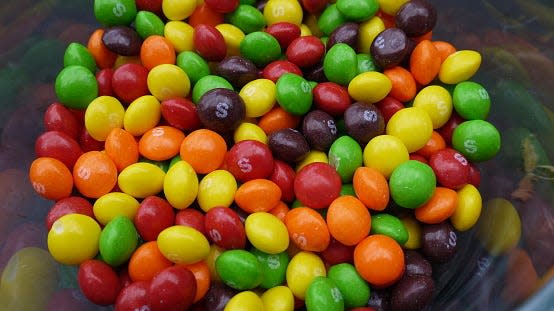Skittles are 'unsafe' for consumers, lawsuit charges, because they contain 'a known toxin'
A consumer sued candy maker Mars, alleging Skittles contain a "known toxin" that makes the rainbow candies "unfit for human consumption."
In a lawsuit seeking class-action status filed in U.S. District Court for the Northern District of California on Thursday, attorneys for San Leandro resident Jenile Thames said Skittles are unsafe for consumers because they contain "heightened levels" of titanium dioxide.
Mars uses titanium dioxide to produce Skittles' well-known array of artificial colors. In 2016, the candy maker publicly shared its intention to remove titanium dioxide from its products in the coming years, the complaint noted Thursday, but titanium dioxide is still used in Skittles.
In a statement sent by Mars to the "Today" show and several other news outlets, the company said, “While we do not comment on pending litigation, our use of titanium dioxide complies with FDA regulations.”
In May: Skittles, Starbursts and Life Saver gummies recalled over possible metal strand in packaging
USA TODAY was unable to reach Mars for additional comment Saturday.

According to the Food and Drug Administration's Code of Federal Regulations, "The color additive titanium dioxide may be safely used for coloring foods generally," but there are several restrictions – such as the quantity of titanium dioxide not exceeding 1% of the food's weight.
Though the regulated use of titanium dioxide in food products is legal in the USA, it's banned in some other countries, including throughout Europe. In May 2021, the European Food Safety Authority announced that titanium dioxide "can no longer be considered safe as a food additive," noting genotoxicity concerns.
Genotoxicity is the ability of chemicals to damage genetic information such as DNA. "After oral ingestion, the absorption of titanium dioxide particles is low, however they can accumulate in the body," Maged Younes, chair of the EFSA’s expert Panel on Food Additives and Flavourings, said in a statement at the time.
Bacon, coffee, Nutella: These favorite foods have cancer links
In the complaint Thursday, Thames' attorneys argued that, in addition to the use of titanium dioxide in its products such as Skittles, Mars did not adequately warn consumers of these health risks.
"Based on Defendant’s omissions, a reasonable consumer would expect that the Product can be safely purchased and consumed as marketed and sold," the complaint reads. "However, the Products are not safe and pose a significant health risk to unsuspecting consumers. Yet, neither before nor at the time of purchase does Defendant notify consumers like (Thames) that the Products are unsafe to consumers, contain heightened levels of titanium dioxide, and should otherwise be approached with caution."
What's everyone talking about? Sign up for our trending newsletter to get the latest news of the day
The complaint pointed to several Mars competitors that, according to the suit, do not use titanium dioxide to color their products – such as Sour Patch Kids and Nerds. Thames' attorneys noted that Mars has other confectionary products, such as M&Ms, "that do not rely" on titanium dioxide.
Thames seeks damages, to be determined in sum at trial, for alleged fraud and multiple violations of California consumer protection laws.
This article originally appeared on USA TODAY: Skittles maker sued; lawsuit alleges 'known toxin' in rainbow candy
